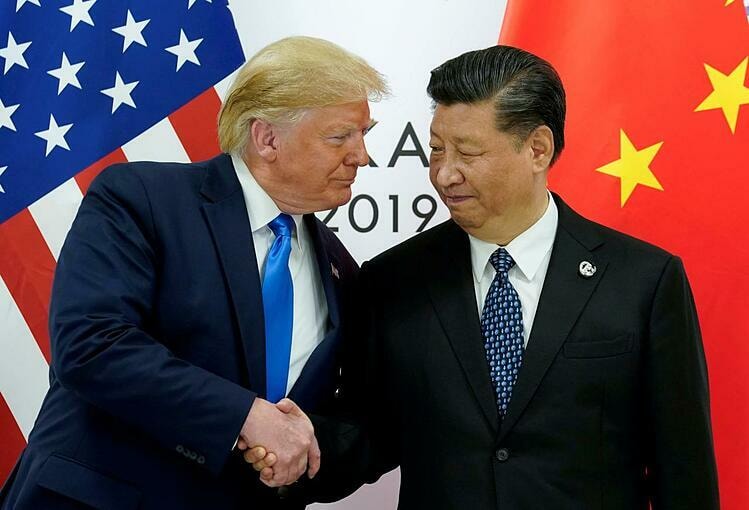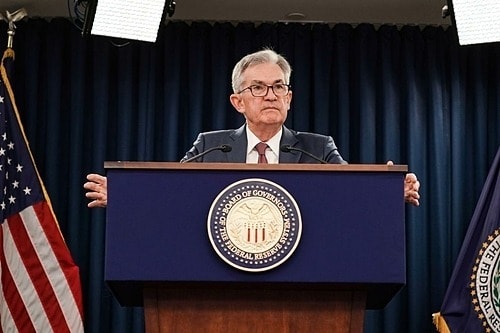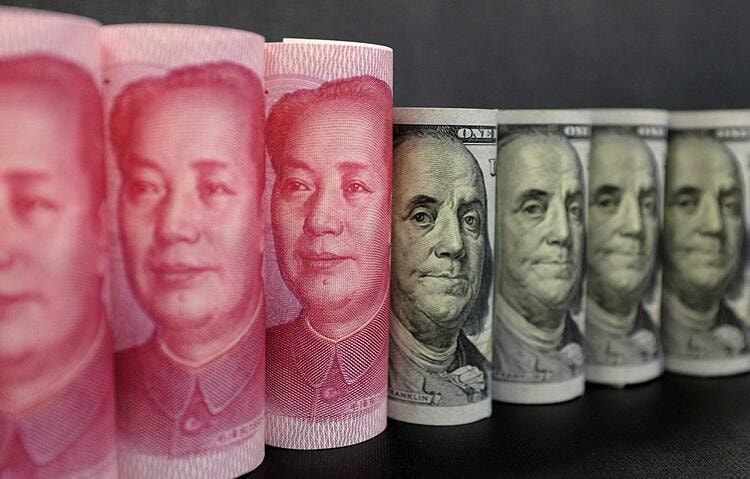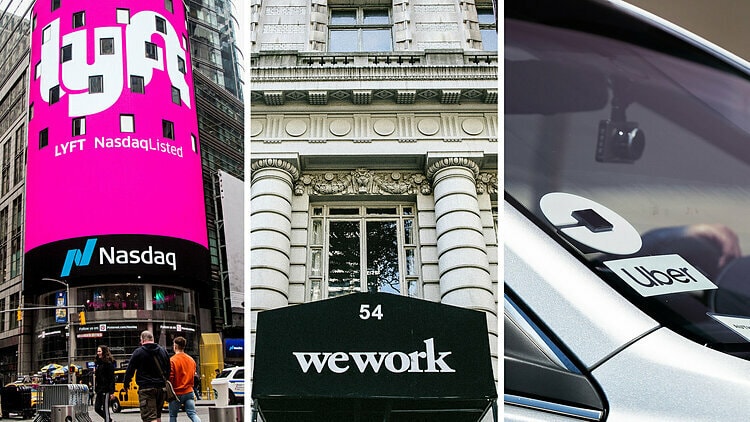Yuan falls to 11-year low against US dollar; Hong Kong falls into recession due to protests
2019 saw many records and "firsts" for economies, but not all events were positive.
1. The US-China trade war has many turning points
|
US President Donald Trump and Chinese President Xi Jinping at the G20 Summit in Japan. Photo:Reuters |
Entering its second year, the trade warThe trade war between the world's two largest economies is expected to be resolved soon, especially after Donald Trump and Xi Jinping agreed to a ceasefire late last year to negotiate a trade deal.
However, the actual negotiation process has been deadlocked and dragged on. For months, senior officials from both sides have been traveling back and forth between the two countries to find a way to resolve the bottlenecks. In May, when it seemed that an agreement was close, the negotiations collapsed. When the US accused China of wanting to change its commitments and raised tariffs to punish it, China also raised tariffs in retaliation.
A month later, Trump and Xi announced a restart of negotiations, but the talks made little progress. By early August, the US had imposed tariffs on another $300 billion worth of Chinese goods. Later that month, China imposed new tariffs on $75 billion worth of US goods, and the US responded by raising tariffs further.
By mid-September, the situation improved again, as the US and China made concessions on tariffs. In mid-October, President Trump announced that the two countries would negotiate a preliminary agreement, with the difficult issues being moved to the next phase. Two months later, the US and China reached a phase one agreement in principle, which somewhat eased market concerns.
2. Wall Street continues to hit new heights
|
S&P 500 index performance this year. |
In contrast to the worst performance in a decade in 2018, all three key indexes of the US stock market, DJIA, S&P 500 and Dow Jones this year continuously set records. The reasons are the US Federal Reserve (Fed) cut interest rates three times, US corporate profits exceeded forecasts and investors were optimistic about the US-China trade agreement.
The S&P 500 has risen 26% since the start of the year, hitting a record high in five of its nine trading sessions. In mid-November, the DJIA also crossed the 28,000 mark for the first time.
With recent data showing the US economy remains stable, the US stock market is expected to continue to rise. However, the increase next year is likely to slow to only a few percent.
3. The Fed cut interest rates for the first time in more than 10 years
|
Fed Chairman Jerome Powell announced a rate cut. Photo:Reuters |
In August 2019, the US Federal Reserve (Fed) lowered interest rates for the first time.since 2008, with a 0.25% reduction. Fed officials say the adjustment is necessary to keep the economy strong, especially given their limited tools to fight a recession with interest rates at record lows.
The move has been long anticipated. The Fed has been forced to pursue a more flexible policy this year in response to growing uncertainty abroad, with trade tensions the biggest concern.
The Fed then cut interest rates two more times this year, in September and October. However, at its December policy meeting, the Fed kept interest rates unchanged and signaled that there would be no adjustments in 2020.
4. Hong Kong falls into recession due to protests
|
A shopping mall in Hong Kong is deserted due to protests. Photo:SCMP |
In late October, Hong Kong announced that its third-quarter GDP fell 3.2% from the previous quarter. This was the second consecutive quarter of negative growth for the city, putting the economy in a theoretical recession.
Hong Kong was already suffering from the US-China trade war and the slowdown in China’s economy. The protests, which have been going on since June and show no signs of ending, have made matters worse.
Figures show that Hong Kong's consumption and exports are both plummeting. Life is also getting harder for residents, with transport paralyzed and tourism down. The city government has had to pump tens of billions of Hong Kong dollars into supporting individuals and businesses hurt by the protests.
5. Yuan falls to 11-year low against US dollar
|
Chinese yuan and US dollar. Photo:Reuters |
This year, China’s currency has plummeted several times due to trade tensions with the US. In August, the yuan fell below the important 7 CNY mark to the US dollar for the first time in 11 years. This development has fueled the risk of a currency war between the world’s two largest economies. Analysts say Beijing could use the yuan as a weapon in the trade war with the US.
Immediately, President Trump criticized China. The US Treasury Department also officially called China a "currency manipulator", for the first time since 1994.
China denied the US accusations, asserting that this development was in line with the market. They continued to devalue their currency for several sessions after that before increasing it again.
6. China's growth slowest in nearly three decades
|
Workers at a construction site in Guangdong (China). Photo:Reuters |
China's economy continues to face pressure both domestically and internationally this year. GDP in the second and third quarters of the country increased by only 6.2% and 6% respectively - the lowest since the early 1990s..
China is accepting a slowdown, aiming to strengthen its financial system and rein in credit. So even without a trade war with the US, the economy is facing a host of challenges, from deflationary pressures (which affect corporate profits) to falling imports (which indicate weaker domestic demand).
Analysts say Beijing will have to roll out more stimulus to stem the slowdown. For now, Chinese authorities have focused on limited, targeted stimulus, such as lowering reserve requirements and interest rates, amid concerns about a debt explosion.
7. Facebook launches Libra, China researches cryptocurrency
|
Virtual currency simulation coin and Libra logo. Photo:Reuters |
In June 2019, Facebook caused a stir when it announced that it would issue a cryptocurrency called Libra, built on a blockchain platform and run by an organization of dozens of well-known companies – the Libra Association. Of course, like other cryptocurrencies, Libra was enthusiastically welcomed by the tech community, but officials expressed doubts.
Facebook leaders have repeatedly explained and testified before the US Congress, affirming that Libra does not compete with other countries' currencies and will protect personal data. However, the future of this digital currency is still very difficult, as many US congressmen want Facebook to abandon this project. France and Germany have both announced that they will ban Libra in Europe. A series of partners in the Libra Association have also withdrawn.
However, this year, cryptocurrencies have attracted more mainstream attention. Online exchanges such as Schwab, E-Trade and TD Ameritrade have allowed trading of Bitcoin futures. The People's Bank of China even announced in August that it would issue a digital currency to replace cash in circulation and support the ambition of internationalizing the yuan. China's leading banks and technology giants will participate in distributing this currency.
8. The year of hardship for billion-dollar startups
|
Lyft, WeWork and Uber logos on the streets of the US. Photo:NYT |
2019 was the year of IPO boom for a series of unicorn companies (private companies valued at billions of dollars). These were IPO deals that investors had been waiting for for a long time. However, the business operations of these companies were not as expected.
Uber, Lyft, and Slack have all struggled to generate profits. Uber lost $1.1 billion in the third quarter and $5.2 billion in the second. Beyond Meat and Peloton haven’t fared much better. Peloton’s stock dropped 11% in its first trading day, a rarity for a tech startup.
Uber shares are down nearly 36% since their IPO, while Lyft shares have lost more than 40%. WeWork even had to cancel its IPO plans, as investors criticized WeWork's valuation, worried about its large losses, the sustainability of its business model, and the management of former CEO Adam Neumann. SoftBank then had to spend nearly $10 billion to rescue WeWork.
These events have led to growing market skepticism about the profitability of unicorns. Many analysts also believe that the value of these companies is being inflated by being labeled as technology companies, while in essence they are not technology companies.








